Disclosure: We may earn commissions if you purchase products after clicking on a link from our site.
Have you always wanted to go fishing for cabezon? Do you want to learn how to catch cabezon? Cabezon is not a widely known fish as they are found on the west coast of the United States. However, it is a prized catch of anglers who fish on the west coast. Imagine catching that big cabezon, taking pictures, and showing it to your family and friends.
Cabezon can be challenging to catch. The fundamental reason is simple: it has a habit of mouth-baiting the bait and then spitting it out. When caught, it will put up a serious fight. In this article, we will discuss how to catch cabezon, the fishing methods to catch this tasty fish, the fishing tackle, as well as fishing tips.
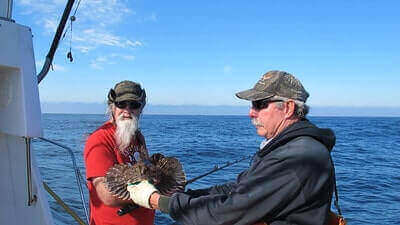
Table of Contents
How To Catch Cabezon
Cabezon can be challenging to catch as they have the habit of tapping or mouth baiting and then spitting out the bait. To be successful when learning how to catch cabezon, you have to be patient and develop the sense of when to set the hook. If you catch one, there is a good chance that there are others in that vicinity.
Vertical jigging works well when fishing for cabezon. Spinners and plugs are not effective as jigs when fishing for cabezon. Cabezon tends to wait in their hideouts for food to come close to them. This will not make spinners and plugs very effective when fishing for cabezon.
1. Bottom Fishing
Bottom fishing is a popular method for targeting cabezon, a species found along rocky coastlines in the Pacific Ocean. Anglers use heavy sinkers to get their bait down to the rocky bottom where cabezon typically resides. Common baits for bottom fishing include squid, shrimp, and various types of fish such as anchovies or mackerel.
The rig used for bottom fishing can vary, but a basic setup consists of a sinker attached to the end of the mainline with a leader and hook above it. Anglers can cast their baited rigs out and allow them to sink to the bottom, then wait for a bite. Cabezon are known to be opportunistic feeders, so anglers may need to experiment with different baits and presentations to find what works best in a particular area.
To learn more about bottom fishing techniques for cabezon, anglers can refer to resources provided by agencies such as the California Department of Fish and Wildlife (CDFW).
2. Drift Fishing
Drift fishing is another effective technique for catching cabezon, especially when targeting them over expansive rocky areas. Anglers can drift along rocky shorelines or over underwater structures such as reefs or rock piles while presenting baits to actively feeding fish.
This method allows anglers to cover a large area of water and locate schools of cabezon that may be moving in search of food. Popular baits for drift fishing include live baitfish, squid strips, or artificial lures designed to imitate baitfish.
Anglers can adjust the weight of their rigs to maintain contact with the bottom while drifting, ensuring that their bait remains in the strike zone. By drifting with the natural currents and wind, anglers can present their baits naturally and enticingly, increasing their chances of enticing a bite from hungry cabezon.
For detailed information on drift fishing techniques and regulations for targeting cabezon, anglers can consult resources provided by agencies such as the Oregon Department of Fish and Wildlife (ODFW).
3. Jigging
Jigging is a versatile and productive technique for catching cabezon, particularly when fishing in deeper water or around submerged structures. Anglers use specialized jigs, typically made of lead or other heavy materials, to mimic the movement of prey species and entice strikes from cabezon.
Jigs come in a variety of shapes, sizes, and colors, allowing anglers to match the local forage and fishing conditions. When jigging for cabezon, anglers can use a variety of techniques including vertical jigging near rocky outcrops or bouncing the jig along the bottom to mimic a fleeing baitfish.
Some anglers may also add strips of bait or scent to their jigs to enhance their attractiveness to cabezon. Jigging requires skill and finesse, but it can be highly effective for targeting aggressive or actively feeding fish. To learn more about jigging techniques and regulations for catching cabezon, anglers can refer to resources provided by agencies such as the Washington Department of Fish and Wildlife (WDFW).
How To Catch By Hand
Some anglers like to catch cabezon by hand, mainly for the challenge. The key to catching Cabezon with your hand is to grab its head. Cabezon has a very large head. If you can get a firm grip on the head, you will catch it and get it out of the water. It can be very dangerous to catch cabezon by hand as the dorsal fins are very sharp.
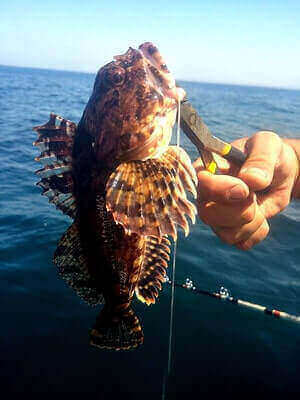
Cabezon Fishing Tackle Setup
Medium-powered, fast-action rod tackle with a 15 lb test line and 2/0 size hooks will work for Cabezon. Cabezon grows up to 18 pounds; therefore, you will need a medium-powered rod. Monofilament lines are a good choice when fishing for cabezon as it is stretchable and abrasion-resistant.
A paternoster rig with a dropper loop knot is the best rig for cabezon fishing. Additionally, use a jig head with the bait at the tip.
Best Baits For Cabezon
- Small Crabs
Small crabs are excellent bait choices for anglers targeting cabezon, prized for their effectiveness in enticing these bottom-dwelling predators. Cabezon has a voracious appetite for crustaceans, and small crabs present a natural and irresistible meal option.
Anglers can catch small crabs using crab traps or by handpicking them from rocky intertidal areas where cabezon are commonly found. Once secured, anglers can rig the small crabs onto their hooks, ensuring that they are presented naturally and enticingly.
Depending on the size of the crabs and the fishing conditions, anglers may opt to use them whole or in pieces, tailoring their presentation to the preferences of the cabezon in the area. Additionally, adding scent to the bait can further enhance its attractiveness and increase the chances of enticing a strike from a hungry cabezon.
When fishing with small crabs, anglers should employ techniques such as bottom fishing or drift fishing, targeting rocky areas and underwater structures where cabezon are known to congregate. By presenting small crabs effectively, anglers can increase their chances of success when pursuing cabezon along the Pacific coast.
For more information on using small crabs as bait and effective fishing techniques for catching cabezon, anglers can refer to resources provided by agencies such as the California Department of Fish and Wildlife (CDFW).
2. Mussels
Mussels serve as a viable bait option for anglers targeting cabezon, providing a natural and enticing offering that appeals to these predatory fish. Cabezon are opportunistic feeders known to consume a variety of prey items, including crustaceans, mollusks, and small fish, making mussels a suitable choice to attract their attention.
Anglers can gather fresh mussels from rocky intertidal areas, ensuring they are still alive and intact before rigging them onto their hooks. Alternatively, commercially available frozen or fresh mussels can also be used effectively. When rigging mussels as bait, anglers should secure them firmly to the hook, ensuring they remain intact during casting and retrieval.
Additionally, anglers can enhance the attractiveness of mussel baits by adding scent attractants to increase their effectiveness in enticing cabezon strikes. Fishing techniques such as bottom fishing or drift fishing are commonly employed when using mussels as bait, allowing anglers to target rocky habitats and underwater structures where cabezon are often found.
By presenting mussels strategically and employing effective fishing tactics, anglers can increase their chances of success when pursuing cabezon. For comprehensive guidance on using mussels as bait and effective fishing strategies for catching cabezon, anglers can consult resources provided by authoritative sources such as the California Department of Fish and Wildlife (CDFW).
3. Squid
Squid is a popular and effective bait choice for targeting cabezon, a prized species among anglers. Cabezon are known to have a voracious appetite, and squid presents a tempting offering that can entice them to strike. Anglers can obtain fresh squid from seafood markets or bait shops, ensuring its quality and freshness before use.
Alternatively, frozen squid can also be utilized effectively. When rigging squid as bait for cabezon fishing, anglers should ensure that it is securely fastened to the hook to withstand casting and the attention of potential predators. One effective method is to thread the squid onto the hook multiple times, ensuring it remains intact during retrieval.
Another approach is to use a bait needle to secure the squid firmly onto the hook, preventing it from slipping off easily. Fishing techniques such as bottom fishing or drift fishing are commonly employed when using squid bait for cabezon, allowing anglers to target rocky habitats and underwater structures where cabezon are often found lurking. By presenting squid strategically and employing effective fishing tactics, anglers can increase their chances of success in hooking these prized fish.
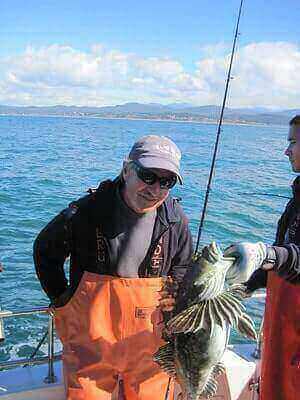
4. Octopus
Octopus is a highly effective bait choice for targeting cabezon, a species known for its carnivorous appetite and preference for a diverse range of prey. When used as bait, octopus presents a natural and enticing option that can attract cabezon to bite. Anglers can acquire fresh octopus from seafood markets or bait shops, ensuring its quality and suitability for fishing purposes.
Frozen octopus can also be used effectively, especially when fresh options are unavailable. Rigging octopus as bait for cabezon fishing involves securely attaching it to the hook to withstand the rigors of casting and potential strikes. One common method is to thread the octopus onto the hook multiple times, ensuring it remains intact during retrieval.
Another approach is to use a bait needle to secure the octopus firmly onto the hook, preventing it from slipping off easily. Anglers typically employ bottom fishing or drift fishing techniques when using octopus bait for cabezon, as these methods allow them to target rocky habitats and underwater structures where cabezon are often found dwelling. By presenting octopus strategically and employing effective fishing tactics, anglers can increase their likelihood of hooking these prized fish.
5. Abalone
Abalone can be an effective bait for catching cabezon, a popular species among recreational anglers. However, it’s essential to note that regulations regarding the use of abalone as bait may vary depending on the location and local fishing regulations. In some areas, using abalone as bait may be restricted or prohibited to protect vulnerable populations of this shellfish species.
Anglers should always check the regulations and guidelines provided by relevant authorities, such as state fisheries departments or marine conservation organizations, before using abalone as bait. If permitted, fresh or frozen abalone can be prepared and rigged onto fishing hooks to attract cabezon.
Rigging abalone effectively involves securing it onto the hook in a way that prevents it from coming loose during casting and retrieval. Some anglers may opt to thread the abalone onto the hook multiple times, ensuring a secure attachment, while others may use bait needles or specialized rigging techniques for this purpose.
When fishing for cabezon with abalone bait, anglers often target rocky reefs, kelp beds, and other areas where cabezon are known to inhabit. Bottom fishing or drift fishing techniques are commonly employed, allowing anglers to present the bait effectively in the fish’s preferred habitats. By following regulations and employing proper rigging and fishing techniques, anglers can responsibly use abalone as bait while targeting cabezon, enhancing their chances of a successful fishing outing.
6. Small Lobsters
Small lobsters can be a valuable bait option when targeting cabezon, a prized species among anglers along the West Coast of the United States. While using small lobsters as bait can be effective, anglers must adhere to local regulations and guidelines regarding lobster harvesting and use as bait. In many areas, there are strict regulations governing the size, season, and method of lobster harvesting to protect the sustainability of lobster populations.
Anglers should consult local fishing regulations and obtain necessary permits before harvesting or using lobsters as bait. When using small lobsters as bait for cabezon, anglers typically rig them onto fishing hooks using secure methods to prevent them from coming loose during casting and retrieval. Some anglers may opt to partially or fully shell the lobster to expose the meat, making it more accessible to the target fish species.
Additionally, anglers may employ various rigging techniques, such as threading the lobster onto the hook multiple times or using bait needles, to ensure a secure attachment. Small lobsters can be particularly effective when fishing in rocky reef areas, kelp beds, and other habitats where cabezon are known to inhabit.
Anglers often employ bottom fishing or drift fishing techniques to present the bait effectively and entice strikes from hungry cabezon. By following local regulations, using proper rigging techniques, and targeting suitable habitats, anglers can responsibly use small lobsters as bait to enhance their chances of success when catching cabezon.
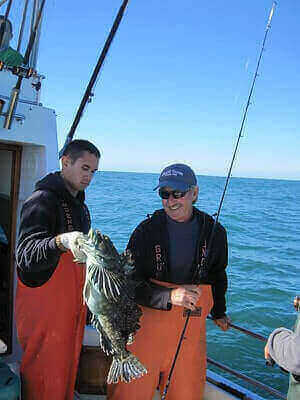
Cabezon vs Lingcod
| Characteristic | Cabezon | Lingcod |
|---|---|---|
| Color | Green | Brown |
| Fins | Huge pectoral and fleshy anal fins | Normal pectoral and anal fins |
| Camouflage | Good camouflaging to surroundings | Better camouflaging |
| Structure | Mainly a big head | Big, long, and streamlined |
| Taste | tasty | tasty |
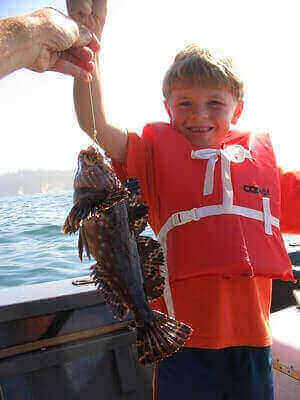
Cabezon Fishing Tips
- Cabezon inhabits the tops of rocky ledges, holes, rocky reefs around jetties, intertidal pools, and waters with little or no movement.
2. Cabezon is a “lie-in-wait predator” as they like to sit and wait for bait to come their way instead of swimming around looking for baitfish.
3. The best baits for cabezon are small cabs and fresh mussels but they will eat almost anything.

4. If you are learning how to catch cabezon, it can be challenging and frustrating as they tend to tap or mouth bait and then spit out the bait.
5. When to set the hook is important when fishing for cabezon, and when you are learning how to catch cabezon, it will come with experience.
6. Cabezon tend to congregate in “cabezon holes”. If you catch one, there may be others in that area. Therefore, quickly drop your bait back into the water.
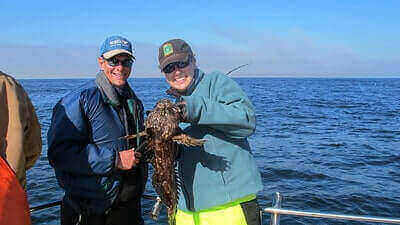
7. Cabezon is good to eat and has a delicate and sweet taste that is similar to crab. However, don’t eat the eggs as they are poisonous.
8. Cabezon’s coloring makes them blend well with their surrounding which helps them remain undetected from the baitfish.
9. Cabezon can be caught inshore and offshore. They usually migrate to shallow water to spawn during winter and fall and this presents a great opportunity to catch them from shallow waters.
10. Cabezon will put up a serious fight when hooked. So be ready for the battle.
11. Cabezon can be caught all year round.
12. Cabezon is usually at depths from 0 to 600 feet.
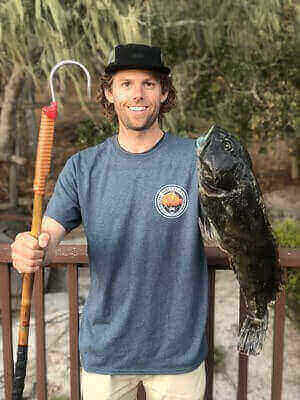
13. When you are learning how to catch cabezon, you will need to set the hook hard as they have a thick and bony mouth.
14. Cabezon are not hook-shy. They will come to your hook and even tap the bait, put it in their mouths, and spit it out.
15. A medium-powered, fast-action fishing rod will work for catching cabezon as it will not break and it will make it easier to set the hook.
16. Monofilament lines are a good choice when learning how to catch cabezon.
17. A dark-colored rig system works when fishing for cabezon.
18. Vertical jigging works when you are fishing for cabezon.
The Bottom Line
Cabezon is not a popular fish as it is only found on the west coast. However, it is a prized catch for anglers as it is a tasty fish. It can be challenging to catch it as it likes to tap the bait and spit it out.
Additionally, it hides in rocky areas and holes. Cabezon does not swim around in search of food. Instead, they lie in wait for prey to swim close to them making it easier to feed.
In this article, we discussed how to catch cabezon, shared information about their behavior, fishing tackle, as well as fishing tips to help you catch this tasty fish. You can also read how to catch burbot, how to catch lingcod, how to catch cod, and how to catch yellow perch.